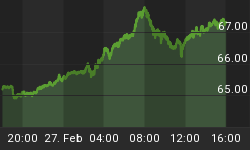The case for metals remains not that of outright inflation but that of central banks prolonged liquidity drives. Currencies will gain/fall versus one another, but fresh asset purchases will maintain gold and silver ahead.
Rising metals remained the consistent play over the past 2 months, supporting my near-term gold outlook for $1270/oz and $1,330 by Q4. Meanwhile, Silver finally breaks the $19.80 ceiling to attain its highest level since March 2008. Unlike gold, silver has yet break its 2008 record high of $21.35/oz. Players are gauging this level with high interest. Each time golds rise hits the headlines, it steels the limelight from it cheaper cousin; silver. But as the charts show below, silver has not only followed closely on the rallies, but usually outperformed gold during the general advances in metalsas shown via the falling Gold/Silver ratio below.

Aside from the evident dynamics of a possible QE2 (quantitative easing phase 2) from the Fed and the Bank of England, gold and silver are especially propped by upcoming wedding season in India (December-February). In general, the demand side is boosted by the Asian harvest, after which farmers spend their hard-earned income in gold. They also include cultural drivers,
The QE argument has also proven to empower gold and silver. We saw this in March 2009 when both the Bank of England and the Fed inaugurated their asset purchases programs. Not only those announcements helped cement a bottom in world equities (Mar 2009), but also helped reenergize the gains in metals and the rest of commodities. 18 months later, the US central bank is widely expected to resume shopping. Last week, Fed chairman Bernankes reiterated that purchases of long term assets are his favourite option for additional easing. The other options included communicating a longer period of exceptionally low rates and reducing interest rate on reserves. Note the Fed has already resorted to renewed asset purchases from the proceeds of maturing agency mortgages aimed at preventing the Balance sheet from contracting. The dollars next selling phase, is due when the Feds asset purchases program shifts from holding the balance sheet unchanged to expanding it.
Despite better-than expected August US jobs report, most private economists see the Fed adding fresh asset purchases later this year. The consensus is for the Fed to purchase between $300 and 500 billion in new US treasuries as part of its attempts to stimulate lending, enhance capital market liquidity and potentially boost the economy.
BoE/ECB/Lending Drive The QE argument for metals could further materialize once markets begin to price in QE2 by the Bank of England. This months comments from BoEs newest MPC member Martin Weale about the possibility for a double dip recession in the US have shaken out GBP, especially as his comments served as an offset for Andrew Sentance's usual rate hike demands. In fact, UK policy have taken a step back after the July core CPI slowed sharply to an annual 2.6%, the lowest since November. On the ECB side, JC Trichet told us this week the central bank will extend its 1-month and 3-month fixed rate lending facilities into Q1 2011. And with 3-month EURIBOR already falling to six-week lows at 0.884%, markets are thoroughly anticipating that central bank easing isnt going ending anytime soon.
Seasonals Helping too
My analysis of golds seasonals indicate that out of the last 8 years, Q4 proved to be the best quarter for the yellow metal, gaining in 7 out of the last 8 years. Q3 and Q1 followed behind, rising in 6 out of the last 8 years. With gold standing well above its 55, 100 and 200-day MAs for the first time since April, $1,275-80 remains the next key target before $1,330 emerges as the next high target. On the downside, $1,200 is starting to act as aninterim support, backed by the more resilient foundation of $1,160. As these dynamics emerge for gold, expect its cheaper cousin to perform at least just as much.
For more frequent FX & Commodity calls & analysis, follow me on Twitter Twitter.com/alaidi















